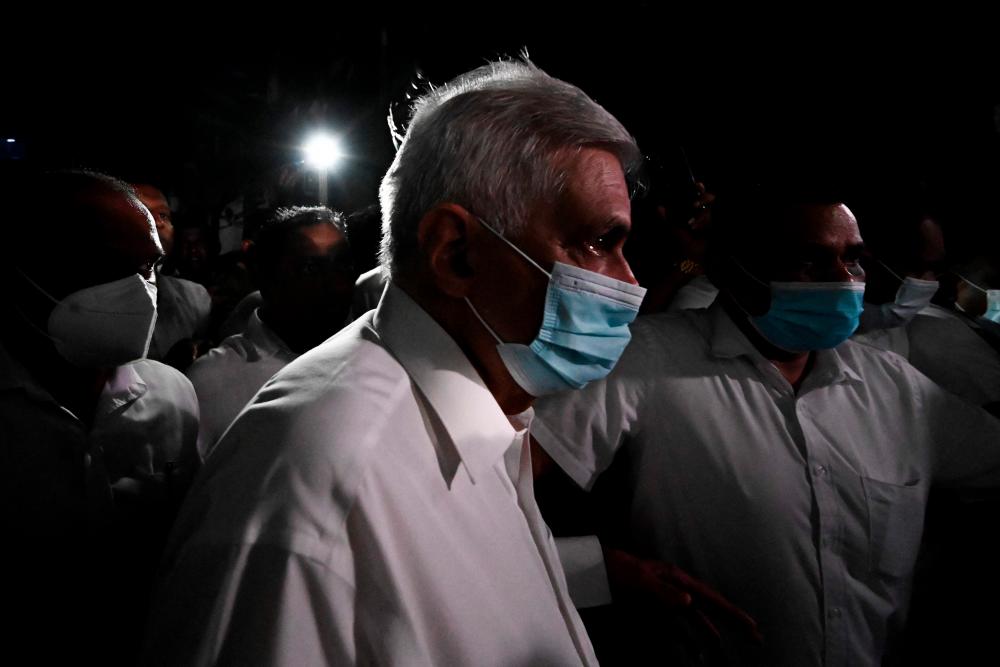COLOMBO: Sri Lanka’s new prime minister struggled Friday to forge a unity government and forestall an imminent economic collapse as opposition lawmakers refused to join his cabinet and demanded fresh elections.
Ranil Wickremesinghe was sworn in late Thursday to navigate his country through the worst downturn in its history as an independent nation, with months of shortages and blackouts inflaming public anger.
The 73-year-old insists he has enough support to govern and approached several legislators to join him, but four opposition parties have already said his premiership lacks legitimacy.
Senior opposition lawmaker Harsha de Silva publicly rejected an offer to take over the finance ministry and said he would instead push for the government’s resignation.
“People are not asking for political games and deals, they want a new system that will safeguard their future,“ he said in a statement.
De Silva said he was joining “the people’s struggle” to topple President Gotabaya Rajapaksa and would not support any political settlement that left the leader in place.
Huge public demonstrations have for weeks condemned Rajapaksa over his administration’s mismanagement of the worsening economic crisis.
Hundreds remain outside his seafront office in the capital Colombo at a protest camp that has for the past month campaigned for him to step down.
De Silva is a member of the Samagi Jana Balawegaya (SJB), the largest opposition party in parliament, which had appeared ready to split over whether to support Wickremesinghe.
But the head of the possible splinter faction, Harin Fernando, said Friday he had returned to the fold.
“I will not support Wickremesinghe’s government,“ Fernando told AFP.
Three smaller parties have also signalled they will not join any unity government, with the leftist People’s Liberation Front (JVP) demanding fresh elections.
However, the cash-strapped government is unlikely to be able to afford polls, or even print ballots, at a time when a national paper shortage forced schools to postpone exams.
‘On with the job’
Paikiasothy Saravanamuttu of the Colombo-based Centre for Policy Alternatives think tank said Wickremesinghe would still likely be able to govern with the support of Rajapaksa-allied lawmakers.
“He’ll appoint a cabinet and get on with the job,“ Saravanamuttu told AFP.
Sri Lankans have suffered months of severe shortages of food, fuel and medicine -- as well as long power cuts -- after the country burnt through foreign currency reserves needed to pay for vital imports.
“We need at least three hours every day to stand in queues and fill petrol,“ said Mangalanadhan Sachin, a frustrated driver waiting at a gas station in Colombo.
“We don’t eat anything in the day. When we return home, there is no electricity.”
The central bank chief warned this week that the economy was just days from “collapse beyond redemption” unless a new government was urgently appointed.
‘Three meals a day’
Wickremesinghe warned Thursday that the dire situation could get worse in the coming months and called for international assistance.
“We want to return the nation to a position where our people will once again have three meals a day,“ he said.
Mahinda Rajapaksa, the president’s brother, resigned as prime minister on Monday after his supporters attacked peaceful anti-government demonstrators.
At least nine people were killed and more than 200 injured in ensuing clashes, with dozens of Rajapaksa loyalist homes set on fire by furious mobs.
Mahinda has since been banned by a court from leaving the country and has taken refuge at the Trincomalee naval base in Sri Lanka’s east.
Troops have restored order and a nationwide curfew has been in effect for most of the week.
Foreign diplomats in Colombo were among the first to call on Wickremesinghe after he officially assumed duties on Friday.
Envoys from China, neighbour India and Japan all pledged to continue providing Sri Lanka with assistance through the crisis, the prime minister’s office said.
Wickremesinghe is seen as a pro-West, free-market reformist, potentially making bailout negotiations with the International Monetary Fund and creditor nations smoother. — AFP















